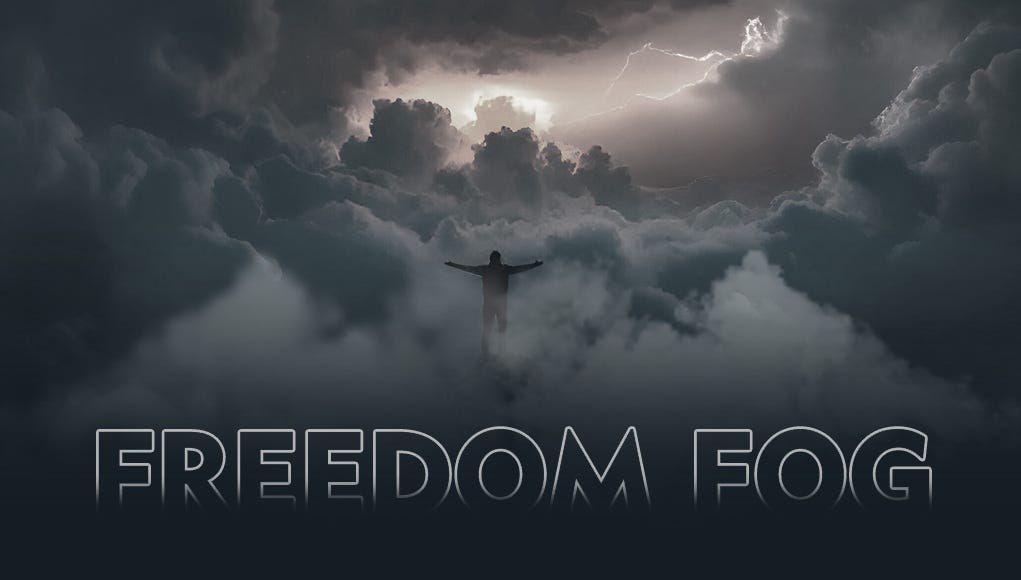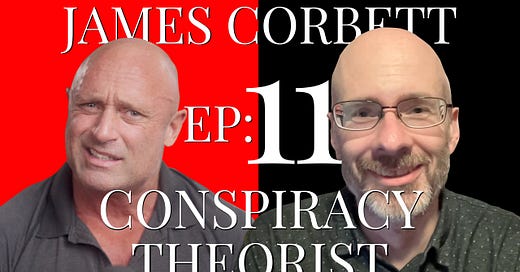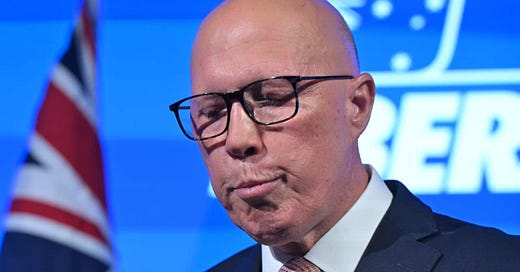
One of the biggest personal journeys I experienced last year was my return to faith and the One Holy, Catholic and Apostolic Church. After 15 years of atheism, several of militant zeal, regular mass attendance and confession was something I never would have predicted for my 2024 bingo card. And in the spirit of confession, there is something that has been weighing on me over the last few months, which has only become more obvious as my faith has deepened: my libertarian ideological purity has waned.
For some, libertarianism offers an appealing ideology: hedonistic individualism re-branded by accountants. Never has justification for living an immoral and debaucherous life sounded more nerdy and boring.
Rambling on about why Mises’ view of central planning is superior to Hayek’s while repeatedly smacking a credit card on a mirror re-frames degenerate drug use into sophisticated philosophy. Instead of analysing the shallowness of hooking up with your fourth romantic partner this week, justify it with some tedious throwaway line about individual liberty. Libertarianism: where any base impulse can be rationalised in the dullest way possible.
Of course, this isn’t unique to libertarians. Socialism, conservatism and all flavours of political ideology lend similar ways to justify personal inadequacy.
Unfortunately, libertarianism lends itself to many seeking to justify hedonistic impulses. Inherently, libertarianism makes no moral judgements; It merely insists that government should not either. And while it is essential we have libertarians warning us of the dangers of excess government, it is also short sighted to say that the government has no role enforcing widely accepted moral behaviour.
While the debate between objective morality and moral relativism is unlikely to be settled in my lifetime, one thing we must acknowledge is that functioning moral societies require clear and transparent moral parameters. Ultimately, many institutions are better placed to provide moral guidance than government; but government should reflect and, at least to a degree, enforce the moral values of the populace it governs. In a Christian country, religious participation should not be legally compelled but, conversely, it is legitimate for government to resist those who utterly oppose the most basic Christian values of peace, charity and honesty.
And of course parents should be responsible for their own children and we shouldn’t require the government to act on their behalf
People must be free to challenge the fringes, but ultimately a community is united by its values. It is therefore appropriate that any authority empowered by the community actually protects those values, religious, secular or otherwise, lest it ceases to be a community at all.
Ironically, the freedom to live a shallow and debaucherous life is no freedom at all. It is enslavement to ones most basic impulses; much as an addict is enslaved to his addiction. According to the Church, “there is no true freedom except in the service of what is good and just. The choice to disobey and do evil is an abuse of freedom and leads to the slavery of sin.”
While some may disagree with the religious trappings, most would agree that freedom without an equal portion of responsibility leads to neither personal fulfilment nor a worthwhile society. Having lived a hedonistic life for most of my adulthood, I can personally verify that no government regulation or public policy has oppressed me more than my own slavery to sin.
However, a fundamental part of finding true freedom is the journey itself. Acting in service of what is good and just out of fear, while undeniably better than not doing so at all, is a flimsy foundation to build upon. An unyielding government that stifles personal development with an overbearing need to eliminate all danger is a worthwhile adversary.
I have been analysing government, society and morality at a conceptual level, but where does this newfound outlook leave me in the gritty and rigid political landscape? In my opinion, it looks like common sense. It looks like putting away the intellectual wankery in favour of real-world solutions. It looks like embracing clear moral values and empowering institutions to protect them, even if sometimes that institution is government.
There are many examples of where libertarians get so high on their own ideological purity they fail to see the forest for the trees. Recent government efforts to prevent children from accessing social media are morally based. It is not an exaggeration to call the ubiquitous combination of social media and smart phones a deadly one – and a novel one. And of course parents should be responsible for their own children and we shouldn’t require the government to act on their behalf, but clearly we do. Because most parents have shown themselves to be completely incapable.
But then there’s the enforcement: there’s the rub. Requiring every single Australian to provide identity documents to nefarious companies just to use a significant part of the internet is a bridge too far. And as I said earlier, it is important that libertarians keep pointing that out; sounding the alarm against big government is a necessary part of a healthy society.
Never has justification for living an immoral and debaucherous life sounded more nerdy and boring.
In a politically divided world we all have a tendency to adopt our political position as our favourite football team. We support it at all costs and view every other one as our enemy. But, at the risk of sounding clichéd, the truth is that we all need each other.
We need conservatives to enforce tradition; we need liberals to highlight when certain traditions lead to oppression; and we need libertarians to showcase the dangers of excessive government. This relationship is dynamic, and it’s high time that more conservatives and libertarians step up to the plate. But completely eliminating liberals, or any group, from this delicate political dance should not be the goal.
While I may have cast myself back into the world of the politically homeless, maybe that’s not such a bad thing. Maybe it is time to lower the walls of our ideological purity, drop the intellectual piety and pick our battles more carefully.



















The article had me riveted to my seat. I praise you James for writing so courageously and personally.
No one of us has to agree with our opponent's stereotype of us as hedonists with drug-addled brains! That's the reactionary - and dare I suggest un-Christian - caricature of the Lyle Sheltons of the world.
I, a committed libertarian, do not smoke, drink alcohol, take drugs nor am I permiscuous. I've never done these things. Gracious, I don't even drink tea or coffee! This is my choice, my free will. These personal traits sit consistently with libertarianism for the here and now, with Christianity for the ever after. No contradiction. Hand-in-glove stuff.
Your article is clearly not a call for theocracy, as another has commented. This is a chronical of one young man's journey of growth.
James,. you beautifully took us through the gap which emerges if a political philosophy, in this case libertarianism, is adopted in isolation.
That's why I wrote "Christian doctrine champions free will, advocating that individuals are morally accountable for their choices, a notion that resonates deeply with libertarian values" in Libertarian, Go To Church This Christmas (see here: https://www.libertyitch.com/p/libertarian-go-to-church-this-christmas?utm_source=publication-search)
As was succinctly described in Libertarianism Is An Ideology But Not A World View (see here https://www.libertyitch.com/p/libertarianism-is-an-ideology-but-not-a-world-view), Ludwig von Mises himself said libertarianism is not meant to be a substitute for religion. Quoting that article: "Libertarianism is concerned exclusively with society, particularly the way it is organised and governed. It possesses neither a cosmogony, nor a cosmology, distinguishing it from classical, if controversial, definitions of religion."
I put it this way: libertarianism is temporal, Christianity is spiritual.
And Bob Day openly talked of them working together when he wrote in How Christianity Informs Classical Liberalism (see here https://www.libertyitch.com/p/how-christianity-informs-classical-liberalism?utm_source=publication-search) when he wrote "Family, faith and freedom are without doubt the best bulwarks against division and authoritarianism."
Far from being "politically homeless", you are walking a well-rodden path of faith and liberty combined.
As President of the Christian Libertarian Initiative, welcome to the fold!
This is an outstanding article, James, for its honesty and common sense.
I, too, share your frustration with how we are supposed to behave regarding our libertarian viewpoint. Like you, my faith has been fervently revived these past few years; but even prior to that revival I sat uncomfortably with declaring myself a libertarian given I have such a longing for tradition. Most of what I read about “tradition” seemed to imply that I couldn’t claim to be libertarian in my thinking. I now know that is just not so.
The only place I would digress with you is government’s role in enforcing any sort of morality on society. They haven’t earned that right and certainly don’t possess any morality of their own to do so. Having said that, I hear your point about establishing parameters so our society stays grounded. I believe the only role they have in that is supporting community groups and our churches to stay the course on this. But alas, that is for an ideal world, and not the technocratic one we currently inhabit.
Thank you for writing this.